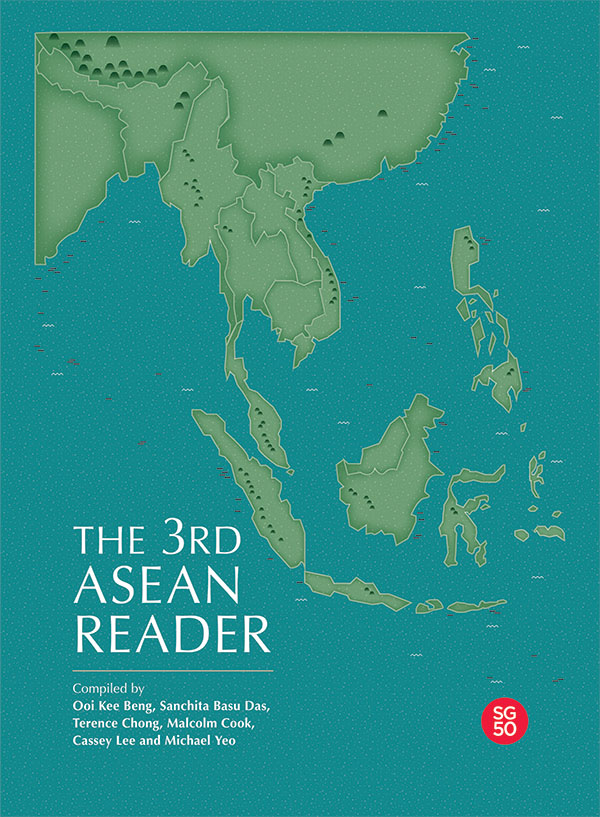Book contents
- Frontmatter
- Contents
- Preface
- Forewords to the First and Second ASEAN Reader: ASEAN: Conception and Evolution
- Forewords to the First and Second ASEAN Reader: ASEAN: The Way Ahead
- Forewords to the First and Second ASEAN Reader: New Challenges for ASEAN
- SECTION I ASEAN: THE LONG VIEW
- SECTION II COUNTRY ANALYSES
- SECTION III COMPARATIVE ANALYSES OF THE REGION
- Southeast Asian Societies
- The Southeast Asian Economy
- Southeast Asian Politics
- SECTION IV INTERNATIONAL DEVELOPMENTS
- SECTION V INSTITUTIONS OF ASEAN
- SECTION VI ASSESSING ASEAN'S INTERNAL POLICIES
- ASEAN Political Security Community
- ASEAN Economic Community
- ASEAN Socio-Cultural Community
- 52 An ASEAN Community for All: Exploring the Scope for Civil Society Engagement
- 53 Civil Society and the ASEAN Community
- 54 The Evolving ASEAN Human Rights System: The ASEAN Human Rights Declaration of 2012
- 55 Divided or Together? Southeast Asia in 2012
- 56 The ASEAN Socio-Cultural Community
- 57 ASEAN Socio-Cultural Community: An Assessment of its Institutional Prospects
- 58 Executive Summary of the Mid-Term Review of the ASEAN Socio-Cultural Community Blueprint (2009—2015)
- SECTION VII ASSESSING ASEAN'S EXTERNAL INITIATIVES
- ASEAN Processes
- ASEAN's Major Power Relations
- SECTION VIII SOUTHEAST ASIA: PERIPHERAL NO MORE
- Bibliography
- The Contributors
- The Compilers
52 - An ASEAN Community for All: Exploring the Scope for Civil Society Engagement
from ASEAN Socio-Cultural Community
Published online by Cambridge University Press: 22 June 2017
- Frontmatter
- Contents
- Preface
- Forewords to the First and Second ASEAN Reader: ASEAN: Conception and Evolution
- Forewords to the First and Second ASEAN Reader: ASEAN: The Way Ahead
- Forewords to the First and Second ASEAN Reader: New Challenges for ASEAN
- SECTION I ASEAN: THE LONG VIEW
- SECTION II COUNTRY ANALYSES
- SECTION III COMPARATIVE ANALYSES OF THE REGION
- Southeast Asian Societies
- The Southeast Asian Economy
- Southeast Asian Politics
- SECTION IV INTERNATIONAL DEVELOPMENTS
- SECTION V INSTITUTIONS OF ASEAN
- SECTION VI ASSESSING ASEAN'S INTERNAL POLICIES
- ASEAN Political Security Community
- ASEAN Economic Community
- ASEAN Socio-Cultural Community
- 52 An ASEAN Community for All: Exploring the Scope for Civil Society Engagement
- 53 Civil Society and the ASEAN Community
- 54 The Evolving ASEAN Human Rights System: The ASEAN Human Rights Declaration of 2012
- 55 Divided or Together? Southeast Asia in 2012
- 56 The ASEAN Socio-Cultural Community
- 57 ASEAN Socio-Cultural Community: An Assessment of its Institutional Prospects
- 58 Executive Summary of the Mid-Term Review of the ASEAN Socio-Cultural Community Blueprint (2009—2015)
- SECTION VII ASSESSING ASEAN'S EXTERNAL INITIATIVES
- ASEAN Processes
- ASEAN's Major Power Relations
- SECTION VIII SOUTHEAST ASIA: PERIPHERAL NO MORE
- Bibliography
- The Contributors
- The Compilers
Summary
This section offers a broad picture of the diverse landscapes in Southeast Asia in which the relationship between civil society and state varies according to the political system, historical circumstances and societal complexion of different countries. It seeks to identify common trends and idiosyncrasies in order to provide a regional overview of civil society in Southeast Asia.
THE ROLE OF THE STATE IN ASEAN MEMBER COUNTRIES
Throughout the 10 ASEAN member states, the state continues to be the most crucial player in setting the conditions for civil society. The state has the power, through the institutional capacities at its disposal, to determine the character and agenda of civil society organisations (CSOs).
However, while the state is a primary player in contemporary societies, the everyday reality on the ground may not necessarily reflect this. As the country chapters indicate, in some countries, civil society has emerged as the key facilitator of public services and education. Here, civil society has either taken over or strongly supplements the state's traditional role in providing public services.
In other cases, the state may indirectly determine the agenda of CSOs through government policies, which may further entrench economic, political, ethnic, religious or cultural divisions in society. Whether in the areas of the economy, housing, or politics, minority groups may be marginalised, resulting in the emergence of CSOs to offer representation. In such instances, civil society-state relations may be strained.
CIVIL SOCIETY-STATE WORKING RELATIONSHIPS: TACIT UNDERSTANDING, ADVOCACY-ORIENTED AND MEDIATED
In light of the diverse conditions, there is no single ASEAN norm or regional modus operandi with regard to civil society-state collaboration or co-operation. CSOs in the ASEAN member countries have had to adapt to and negotiate the specific political and historical terrain in their respective countries.
The working relationship between CSOs and the state may best be characterised as one of ‘tacit understanding’ where there is a convergence of interests between CSOs and the state, especially in the area of public service delivery. The authoritarian state may not have the capacity, expertise or the (political) will to effectively deliver basic public services such as health and educa-tion, and thus relies on CSOs and/or international non-government organisations (INGOs) to fund and deliver such basic services.
- Type
- Chapter
- Information
- The 3rd ASEAN Reader , pp. 273 - 277Publisher: ISEAS–Yusof Ishak InstitutePrint publication year: 2015



